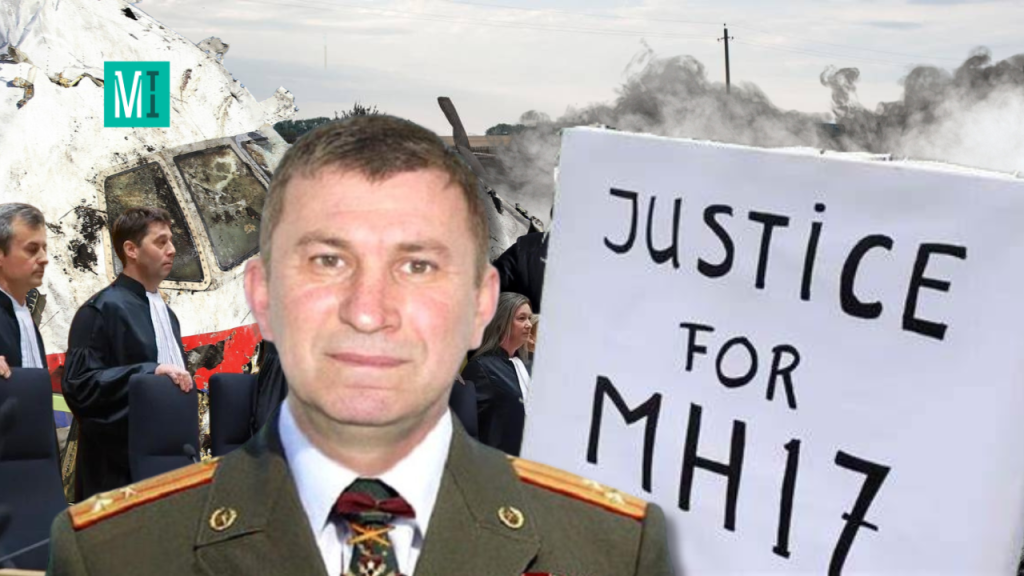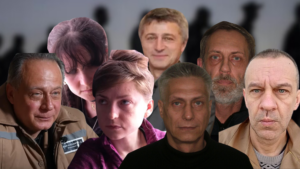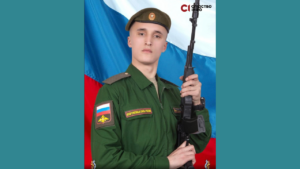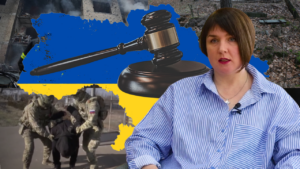A Ukrainian Court Sentenced Dubinskyi, Responsible for Downing the Malaysian Boeing, on Charges of Terrorism Rather Than a War Crime

In May 2024, the Pavlohrad Town District Court sentenced Serhii Dubinskyi in absentia. In 2014, he was a colonel in the Russian GRU [Main Directorate of the General Staff of the Armed Forces of the Russian Federation], leading the Intelligence Department of the ‘DNR.’ He was involved in the downing of the Boeing 777, flight MH17, flying from Amsterdam to Kuala Lumpur. The plane was shot down over the Donetsk region, resulting in the deaths of 298 people.
However, in Ukraine, Dubinskyi was not convicted for directly downing the plane but for waging aggressive war and participating in the ‘DNR’ terrorist organization. Experts emphasize that this is a misclassification. You can find out why this is important and how this verdict differs from that of The District Court of The Hague in the MIHR analysis.
Who is Dubinskyi, and what was he convicted for?
Serhii Dubinskyi is a Russian citizen who fought in Afghanistan and Chechnya and received several military awards from the Russian Federation. When Russia instigated the war in eastern Ukraine, Dubinskyi was a colonel in the GRU. He became the deputy of Ihor Hirkin, the so-called Minister of Defense of ‘DNR.’ He also headed the Intelligence Department of ‘DNR.’ To maintain secrecy, he used the alias ‘Serhii Petrovskyi’ and the call sign ‘Khmury’ [Gloomy.]

Serhii Dubinskyi was convicted in the case of the downing of the Boeing 777, flight MH17, for waging aggressive war and participating in the ‘DNR’ terrorist organization
Ukrainian investigators completed the investigation against Dubinskyi in 2018. The case file states that from August to December 2014, Dubinskyi led the fighting against Ukrainian forces in the Donetsk region, including at the Donetsk airport. For this, he was awarded the special military rank of Major General of the Russian Armed Forces Reserve. He issued orders and supervised the seizure of buildings and other facilities in the Donetsk region, engaged in looting, and organized the operations of the occupation structures. In January 2015, Dubinskyi was dismissed from his position in the occupied Ukrainian territories due to corruption.
Evidence and The Hague Court
Among the evidence examined by the Pavlohrad court were the testimonies of two witnesses, media publications, recorded telephone conversations of the accused, and the verdict of the District Court of The Hague, which in absentia sentenced Dubinskyi to life imprisonment for the downing of the Boeing on November 17, 2022. Along with him, Ihor Hirkin and Leonid Kharchenko were found guilty of destroying the aircraft and killing people. Thus, in The Hague, as in Ukraine, he was not tried for a war crime.

Fragment of the downed Boeing 777 flight MH17. Photo: aviamuseum
The Pavlohrad court examined a fragment of The Hague Court’s verdict, which refers to Dubinskyi’s phone calls. The intercepted conversations reveal that he was in charge of combat units in the Donetsk region and discussed the delivery of ‘Buk’ from Russia to the village of Pervomaiske, where the Boeing was shot down. Dubinskyi linked the downing of the aircraft to the ‘Buk’ they had received, spoke on the phone about searching for the black boxes from the downed plane, and discussed transporting the anti-aircraft missile system back to Russia.
During the hearings at the Pavlohrad court, Serhii Tiunov testified. He had befriended Dubinskyi while serving in Afghanistan. In 2014, Tiunov volunteered to fight on the side of the Ukrainian Armed Forces, led the Zaporizhzhia ‘Self-Defense’ group, and was involved in prisoners’ release. In an attempt to release the son-in-law of an acquaintance, he contacted Dubinskyi. He discovered the latter was heading the ‘DNR’s’ Intelligence Department. On Tiunov’s account, Dubinskyi helped him release Ukrainians several times and invited him to join his service. Tiunov also asked Dubinskyi why the Boeing had been shot down. Dubinskyi explained that it was not their decision but an order from Moscow. The witness recognized Dubinskyi in the photos provided by the investigators.

A group photo of witness Serhii Tiunov (center, in the back) and convicted Serhii Dubinskyi (left, with an assault rifle). Photo: Novaya Gazeta
Another witness is Ivan Beziazykov. He is a Colonel in the Armed Forces of Ukraine who, in 2014, during the fighting in eastern Ukraine, was captured by ‘DNR’ units while attempting to negotiate a prisoner exchange. Ukrainian investigators accused him of switching sides and collaborating with the DNR’s Intelligence Department. In 2020, he was convicted of treason.
Beziazykov testified that while he was imprisoned in Donetsk, he met Dubinskyi. Dubinskyi used an alias and call signs. On the witness’s account, Dubinskyi was in charge of the Intelligence Department and was involved in the downing of Boeing. He held the rank of Colonel and communicated with representatives of Russian Special Services. The witness confirmed that the photos provided by the investigators depicted Dubinskyi.

PHOTO: Intelligence officer Colonel Ivan Beziazykov in court. Photo: moloda.kiev.ua
The court reviewed the protocols of inspections of publications on Russian propaganda sites regarding the activities of the ‘DNR.’ These publications confirmed that Dubinskyi was the head of the Intelligence Department and included his alias and call signs. Other evidence included protocols of media investigations discussing the identification of Dubinskyi.
The court also examined wiretaps of the accused, his interlocutors, and other ‘DNR’ officials. These are the same recordings that were reviewed by The Hague Court. They contain information about Dubinskyi, such as his age, call signs, the time of awarding his special rank, phone number, address, and his statements about the ‘Buk’ being ‘scheduled for delivery in the morning.’
The Pavlohrad court classified Dubinskyi’s actions under Part 2 of Article 437 of the Criminal Code of Ukraine — waging aggressive warfare — and Part 1 of Article 258-3 of the Criminal Code of Ukraine — participation in a terrorist organization. Dubinskyi was sentenced to 14 years of imprisonment with confiscation of property. The verdict was passed in absentia, so Dubinskyi will serve his sentence in case of detention.
In the verdict, the court stated that Dubinskyi waged aggressive warfare on behalf of Russia in the context of an international armed conflict. For this purpose, he led the ‘DNR’ unit, which was under the overall control of the Russian Federation.

An installation in the park across from the Russian Embassy in The Hague. 298 empty chairs symbolize the victims of the downed Boeing 777, flight MH17. 2020. Photo: Associated Press
However, the paradox is that in the same verdict, the court acknowledged Dubinskyi’s guilt for participating in a terrorist organization and noted that the ‘DNR’ is merely a terrorist organization, not a part of the Russian armed forces. In support, the court noted that Russia denied any control over the ‘DNR’ at the time of the prosecution.
Misclassification
Ukraine declares that the war with Russia has been ongoing since 2014 and that the ‘LNR’ and ‘DNR’ are not independent entities but rather Russian puppets that have been part of the Russian occupation forces since 2014. So why was there such a verdict for Dubinskyi?
The paradoxical approach is explained by the fact that Dubinskyi is not recognized as a combatant—a member of the armed forces of one of the warring parties. Under international humanitarian law, combatants cannot be prosecuted for their involvement in a war—only for crimes committed during hostilities. In this case, however, the court pointed out that since the ‘DNR’ is not part of the Russian armed forces, Dubinskyi is not a combatant and can be prosecuted for waging an aggressive war.
“The members of the ‘DNR’ had no right to participate in hostilities, and therefore, they do not have immunity from prosecution,” the court stated in its verdict.
This echoes the reasoning of The Hague District Court: the defendants are not considered combatants, so they can be prosecuted. The Hague court initiated the case under general criminal charges of downing the aircraft and causing the deaths of those on board rather than under the war crime article. This approach provided a sense of legal justice for the victims, as it reduced the chances of a successful defense for the accused.

Judges of The Hague District Court at the first hearing in the case of the downing of Boeing 777 flight MH17. Photo: Hromadske
However, this same approach in the Ukrainian judicial system contradicts the official stance of the state, which asserts that the Russian occupation began in 2014.
Why the downing of Boeing is considered a war crime
Andrii Yakovliev, a lawyer, attorney, and expert at the MIHR, insists that the downing of Boeing is a war crime. It was committed under the principle of responsibility of military commanders, often inaccurately referred to as ‘command liability.’ Dubinskyi was not the only person who carried out the crime. The command of the Russian troops provided the ‘Buk’ missile system. They also monitored the airspace over the Donetsk region using anti-aircraft warfare.
At the same time, Yakovliev believes that the accusation against Dubinskyi of waging an aggressive war is unlikely to be justified. While Article 437 of the Ukrainian Criminal Code allows for the prosecution of anyone for the crime of aggression, international law holds the country’s top military and/or political leadership liable in this case.

Andrii Yakovliev, a lawyer, attorney, and expert at the MIHR. Photo: Viktor Kovalchuk
The Supreme Court points to this as well. By the criteria for the subject of the crime, liability for unleashing an aggressive war lies with individuals “who, by their official authority or actual societal position, can exercise effective control over or direct political or military actions, and/or significantly influence political, military, economic, financial, informational, or other processes in their own country or beyond, and/or manage specific areas of political or military actions.”
― Although Dubinskyi was referred to as Hirkin’s deputy, it is doubtful that he can be considered a leader of the organized groups created by the Russian Federation, ― Andrii Yakovliev emphasizes. ― The decision doesn’t clearly state whether Dubinskyi could exercise significant authority over Russia’s political or military actions in eastern Ukraine.
The second part of the accusation under Article 258-3 of the Ukrainian Criminal Code, concerning participation in a terrorist organization, is even more contentious, as Yakovliev states. The verdict essentially denies that the ‘DNR’ was part of Russia’s armed forces, implying that the ‘DNR’ allegedly operated as an independent terrorist group. At the same time, the court acknowledged the existence of an international armed conflict, during which the ‘DNR’ terrorist organization was under Russia’s overall control, where Dubinskyi was implementing the tasks of the Russian Federation within the framework of this international armed conflict.
―These are the crucial circumstances, ― Yakovliev continues.―The concept of ‘overall control’ in international law means control over groups. So, as soon as the court concluded that overall control existed, it immediately determined that the members of the ‘DNR’ were under Russia’s control and, in fact, part of it.
However, the court then contradicted its conclusion, stating that Russia denied any control over the ‘DNR’ at the time of the indictment. Therefore, its members cannot be considered part of the Russian armed forces. The court also analyzed the term ‘combatant’ in the context of Article 43 of the First Additional Protocol to the Geneva Conventions. It concluded that the members of the ‘DNR’ did not have combatant privileges, as they were not formally part of Russia’s armed forces.
In explaining its conclusion, the court emphasized that the armed forces must be subject to an internal system of military discipline, which, in particular, ensures compliance with international law, and the combatant privilege can only be applied if these criteria are met.
However, the provisions of international humanitarian law (IHL) state otherwise. Part 2 of Article 44 of Protocol I specifies that violations of international law by combatants do not deprive them of the right to be considered a combatant.

PHOTO: Fragment of the downed Boeing 777 flight MH17. Photo: aviamuseum
This aspect is crucial. The failure to recognize Dubinskyi’s combatant status is a weak point in both the Ukrainian and Dutch verdicts regarding the downing of Boeing. The arguments of The Hague court were that the ‘DNR’ did not claim to be part of the Russian army, and its members did not comply with IHL, as combatants are supposed to do. The same reasoning was later echoed by the Pavlohrad court.
By rejecting the combatant status, The Hague court was able to hold the accused accountable for general criminal offenses. However, this excluded Russian military command from suspicion, as they had ordered the deployment of the Buk missile system to the occupied territory and/or left it without supervision or intentionally allowed or ordered the downing of the civilian aircraft. In general criminal law, there is no principle of command responsibility.
Andrii Yakovliev believes that Dutch investigators were likely trying to balance by holding the identified defendants accountable and successfully classifying their actions in a way that would not lead to their acquittal. During an armed conflict, parties can target enemy aerial objectives. There was a risk that the downing of Boeing could be considered a mistake rather than a deliberate action under these circumstances.
― To avoid such defense arguments, Dutch law enforcement officials deliberately refrained from labeling it as an international armed conflict. This was a specific tactic, ― Yakovliev explains. However, due to this, the decision cannot be used going forward. In other words, the Netherlands cannot continue the investigation against the commanders.
In February 2023, the Joint Investigation Team (JIT), which was investigating the downing of MH17, reported that due to a lack of evidence, there were no new cases to be transferred to court.
― We now have the same problem, ― Andrii Yakovliev claims, ― because if Dubinsky acted as part of a terrorist group rather than as part of the Russian armed forces and under their command, then we too will be unable to hold the higher Russian command criminally liable for committing a war crime.
Following the appeal, the Dnipro Appellate Court upheld the Pavlohrad court’s verdict by ruling on July 4, 2024.
Anastasiya Zubova, journalist at the MIHR







